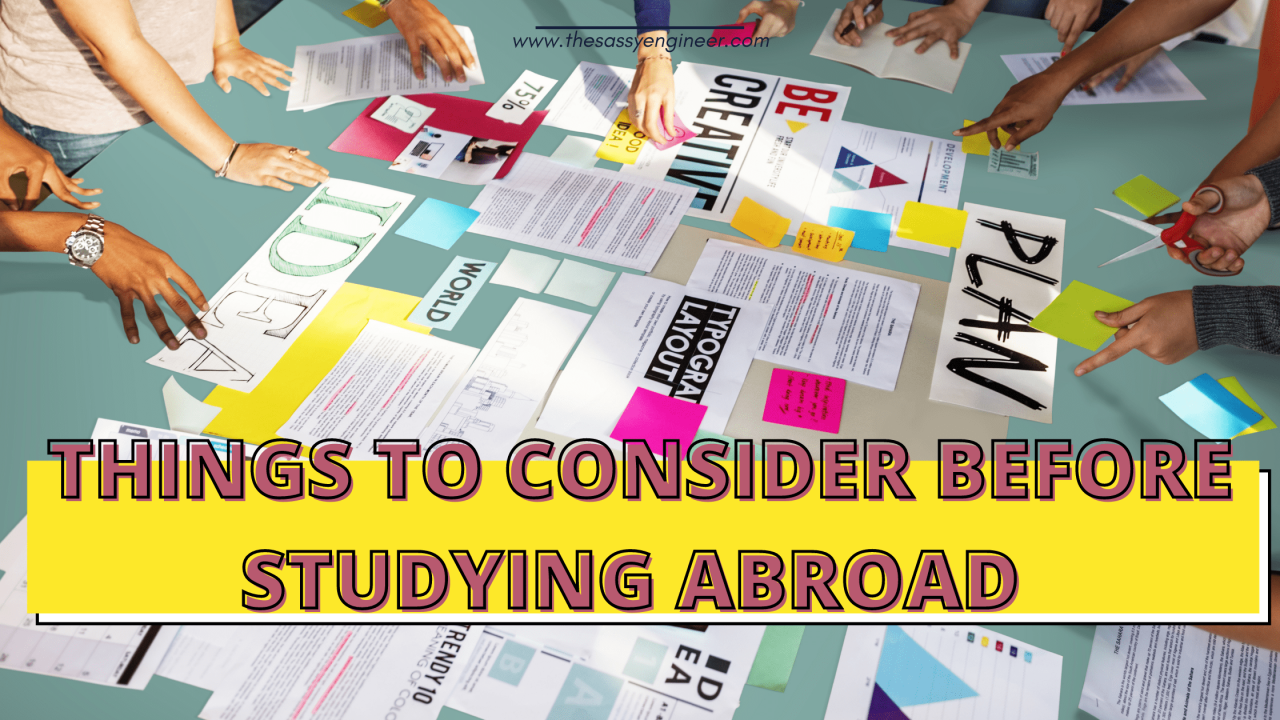
What to Know Before You Decide to Study Abroad
What to know before you decide to study abroad – The idea of studying abroad is exciting, a chance to immerse yourself in a new culture, learn a new language, and broaden your horizons. But before you pack your bags and book your flight, there are some important things you need to consider.
What to know before you decide to study abroad is a crucial step in making this life-changing decision, ensuring a smooth and enriching experience.
From financial planning and academic requirements to visa procedures and cultural adjustments, studying abroad involves a multitude of factors that require careful consideration. This comprehensive guide will delve into the essential aspects you need to be aware of, empowering you to make an informed decision and embark on a successful journey abroad.
Visa and Immigration

Studying abroad requires navigating the complexities of visa and immigration regulations. Understanding the different visa types, application processes, and potential challenges is crucial for a smooth transition.
Types of Visas for Studying Abroad
Different countries have different visa requirements for international students. The most common type of visa for studying abroad is a student visa.
- Student Visa:This visa is specifically designed for students who want to pursue academic studies in a foreign country. It allows students to study, work part-time, and stay in the host country for the duration of their studies.
- Work Permit:Some countries may require students to obtain a work permit in addition to their student visa, particularly if they plan to work part-time or full-time during their studies. Work permits often have specific eligibility criteria and limitations.
Culture and Language

Stepping into a new culture is like entering a different world. It’s an exciting adventure, but it’s also important to be prepared for the cultural differences you might encounter. Understanding local customs, traditions, and social norms can help you navigate your new environment with confidence and respect.
Cultural Differences
Cultural differences can range from subtle nuances in communication to significant variations in social etiquette. It’s essential to be aware of these differences to avoid misunderstandings and build meaningful connections with the locals. For example, in some cultures, direct eye contact is considered respectful, while in others, it might be seen as aggressive.
Similarly, greetings and farewells can vary greatly. Understanding these differences can help you communicate effectively and avoid unintentional offense.
Essential Phrases and Vocabulary
Learning a few basic phrases in the local language can go a long way. Even if you don’t become fluent, showing an effort to communicate in the local language can be greatly appreciated. Here are some essential phrases and vocabulary to get you started:
Hello
[Insert local language greeting]
Thank you
[Insert local language for thank you]
Please
[Insert local language for please]
Excuse me
[Insert local language for excuse me]
I don’t understand
[Insert local language for I don’t understand]
Where is the bathroom?
[Insert local language for where is the bathroom?]
Deciding to study abroad is a big decision, and it’s important to weigh all the factors, like cost, visa requirements, and language barriers. But while you’re planning your future, it’s also crucial to stay informed about the current political landscape, like the supreme court is about to rule on another scary voting rights case.
This kind of news can impact your ability to vote in future elections, which is something to consider when choosing where to live and study.
Adapting to a New Culture and Language, What to know before you decide to study abroad
Adapting to a new culture and language environment takes time and effort. Here are some tips to help you adjust smoothly:* Language courses:Enroll in a language course to learn the basics of the local language.
Cultural immersion activities
Deciding to study abroad is a huge step, and it’s important to be prepared for the challenges and rewards that await. One thing to consider is the educational system in your chosen country, which might be quite different from your own.
This is where the science of coaching teachers edsurge news can offer valuable insights. Understanding how teachers are trained and supported in different cultures can help you adjust to the academic environment and make the most of your study abroad experience.
Participate in cultural immersion activities such as visiting museums, attending local events, or joining a language exchange program.
Deciding to study abroad is a big decision, and there’s a lot to consider before you take the plunge. From visa requirements to cultural differences, there are many logistical and personal aspects to think about. It’s also crucial to be aware of the legal landscape in your host country, especially when it comes to emerging technologies like cryptocurrency.
The Ministry of Home Affairs in India has recently issued guidelines for dealing with crypto-related crimes, which is something to be aware of if you’re planning to study in India. mha body issues norms for crypto related crimes Understanding the legal framework can help you navigate any potential issues and ensure a smooth and enriching experience abroad.
Be open-minded
Be open to new experiences and perspectives. Avoid making judgments based on your own cultural norms.
Ask for help
Don’t be afraid to ask for help from locals or other expats. They can provide valuable insights and guidance.
Be patient
It takes time to adjust to a new culture and language. Be patient with yourself and embrace the learning process.
Safety and Security

Studying abroad is an exciting adventure, but it’s crucial to prioritize your safety and security. Understanding the safety measures in place and taking necessary precautions will ensure a positive and worry-free experience.
Safety Measures and Crime Rates
Every country has its own unique safety profile. It’s essential to research the crime rates and safety measures in your chosen destination. Reliable sources such as government websites, international organizations, and local news outlets can provide valuable information.
For example, the United States Department of State’s website offers travel advisories for different countries, highlighting potential risks and safety concerns.
Staying Safe While Studying Abroad
Staying safe while studying abroad involves a combination of personal security, health precautions, and travel insurance.
Personal Security
- Be Aware of Your Surroundings:Always pay attention to your surroundings and avoid walking alone in isolated or poorly lit areas, especially at night.
- Keep Valuables Secure:Avoid carrying large amounts of cash or expensive jewelry. Use secure accommodations and keep your passport and other important documents in a safe place.
- Trust Your Instincts:If you feel uncomfortable or unsafe in a situation, trust your instincts and remove yourself from it.
- Learn Basic Phrases:Knowing a few basic phrases in the local language can be helpful in emergencies.
Health Precautions
- Get Necessary Vaccinations:Consult your doctor about necessary vaccinations and recommended medications for your destination country.
- Travel Insurance:Obtain comprehensive travel insurance that covers medical emergencies, evacuation, and lost or stolen belongings.
- Stay Hydrated and Eat Safely:Drink bottled water and avoid eating from street vendors unless you are certain about their hygiene standards.
- Be Aware of Local Health Risks:Research potential health risks such as mosquito-borne diseases or food poisoning and take appropriate precautions.
Emergency Services
Familiarize yourself with the emergency services in your host country. Emergency numbers, such as police, ambulance, and fire departments, should be readily available. It’s also advisable to learn how to contact your country’s embassy or consulate in case of an emergency.
Housing and Accommodation
Finding a place to live is a crucial part of the study abroad experience. It impacts your daily life, your budget, and your overall experience. You have several options to choose from, each with its own pros and cons.
On-Campus Housing
On-campus dorms are a popular choice for first-time students abroad. They offer a sense of community, convenience, and often come with built-in support systems.
- Convenience:On-campus dorms are typically located close to academic buildings, libraries, and other campus facilities, making it easy to get around.
- Community:Living in a dorm can help you meet new people from different backgrounds and build friendships.
- Support:Many universities offer on-campus support services for international students, including academic advising, language assistance, and cultural orientation programs.
- Cost:On-campus dorms are often more affordable than off-campus housing, especially when you consider utilities and other expenses.
Off-Campus Apartments
Off-campus apartments offer more privacy and independence than dorms. You can choose a place that suits your needs and budget, and you have more control over your living environment.
- Privacy:Off-campus apartments provide more space and privacy than dorms. You can choose roommates or live alone, depending on your preferences.
- Flexibility:Off-campus apartments often come with more flexibility in terms of lease terms and amenities. You can choose a place with specific features, like a laundry room or a parking space.
- Independence:Living off-campus allows you to experience more independence and responsibility. You’ll need to manage your own finances, utilities, and household chores.
Homestay Arrangements
Homestay arrangements involve living with a local family. This can be a great way to immerse yourself in the local culture, improve your language skills, and experience everyday life in a new country.
- Cultural Immersion:Homestay arrangements offer a unique opportunity to experience the local culture firsthand. You’ll learn about customs, traditions, and everyday life from your host family.
- Language Learning:Living with a local family can significantly accelerate your language learning process. You’ll have daily opportunities to practice speaking and listening in a natural environment.
- Support:Host families can provide valuable support and guidance, especially for first-time students abroad. They can answer questions, offer advice, and help you navigate the local area.
Health and Well-being
Studying abroad is an exciting adventure, but it’s important to prioritize your health and well-being while navigating a new environment. This section will delve into the healthcare systems, travel insurance, and mental health resources available to support your journey.
Healthcare Systems and Access to Medical Services
Understanding the healthcare system in your destination country is crucial. Research the availability and accessibility of medical services, including hospitals, clinics, and pharmacies. Familiarize yourself with the process of seeking medical attention, including appointment scheduling, insurance coverage, and emergency procedures.
- Public Healthcare Systems:Many countries have public healthcare systems funded by taxes, providing subsidized or free medical services to residents. However, access and waiting times can vary depending on the country and region.
- Private Healthcare:Private healthcare options are available in most countries, offering faster access to medical services and more personalized care. However, these services can be expensive.
- Emergency Services:Familiarize yourself with the emergency contact numbers (e.g., 911 in the US, 999 in the UK) and the location of the nearest emergency room.
Travel Insurance
Travel insurance is essential for international students. It provides financial protection against unexpected medical expenses, trip cancellations, lost luggage, and other unforeseen circumstances.
- Medical Coverage:Travel insurance often includes coverage for medical emergencies, hospital stays, and medical evacuation. Ensure your policy covers the type of medical care you might need in your destination country.
- Trip Cancellation:This coverage protects you against financial losses if you need to cancel your trip due to unforeseen events, such as illness, injury, or family emergencies.
- Lost Luggage:Travel insurance can reimburse you for lost or damaged luggage during your travels.
Mental Health Support
Studying abroad can be an exciting but challenging experience, potentially leading to homesickness, culture shock, and stress. It’s important to prioritize your mental well-being and seek support when needed.
- University Counseling Services:Most universities offer free or low-cost counseling services to students. These services can provide confidential support and guidance for a range of mental health concerns.
- Student Support Groups:Many universities and organizations offer support groups for international students, providing a safe space to connect with others who understand the challenges of studying abroad.
- Online Resources:Numerous online resources, such as mental health apps and websites, can provide information, support, and tools for managing stress and anxiety.
Ending Remarks: What To Know Before You Decide To Study Abroad
Studying abroad is an incredible opportunity for personal and academic growth. By understanding the financial, academic, visa, cultural, safety, housing, and health considerations, you can navigate the challenges and embrace the rewards of this transformative experience. Remember to plan ahead, seek support, and embrace the adventure that awaits you in a new country.






